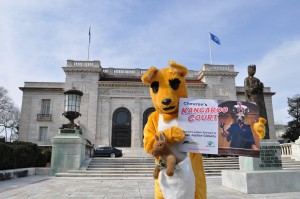 Chevron’s kangaroo court is meeting this weekend in a rented room in Washington, DC. We thought they might need an actual kangaroo for the meeting, so we brought one.
Chevron’s kangaroo court is meeting this weekend in a rented room in Washington, DC. We thought they might need an actual kangaroo for the meeting, so we brought one.
It wasn’t a real kangaroo, it was an activist in a kangaroo costume. But that’s okay, this isn’t a real court of justice, either.
In fact, in no way does this kangaroo court, also known as an “investor-state case” arbitration panel, resemble a legitimate forum for Chevron to be seeking the dismissal of the $18 billion judgment issued against the company for dumping a massive amount of oil pollution in the Ecuadorean Amazon — but that’s exactly what the company is trying to do anyway. Courthouse News has a good run down of the arbitration process and why the Ecuadorean plaintiffs are calling it out as illegitimate.
As I wrote yesterday, this kangaroo court is being convened at Chevron’s request under the U.S.-Ecuador Free Trade Agreement. The panel is made up entirely of corporate lawyers who get paid hundreds of dollars per hour to be part of the panel (we sent a letter to the arbitrators asking exactly how much they stand to make from being on Chevron’s kangaroo court, and received a response saying they would “consider” our request).
[set_id=72157629260765627]
The issue the arbitrators are poised to consider this weekend is whether or not they have jurisdiction to order the Ecuadorean government to override its courts and quash the historic lawsuit brought against Chevron by 30,000 Ecuadoreans suffering the impacts of Chevron’s oil contamination in the Amazon. Such an intervention by the executive branch in judicial matters would be completely unconstitutional in Ecuador, just as it would be in the US.
The plaintiffs are not part of the hearing, nor do they want to be. This secret arbitration panel is a desperate, last-ditch attempt by Chevron to evade responsibility for its catastrophic pollution in the Amazon.
The three lawyers on the panel — one picked by Chevron, one picked by Ecuador, and an “independent” panelist picked by the other two — are meeting in a rented room at the Organization of American States. Whatever ruling comes out of this closed-door meeting will have no bearing on the case, as Chevron is asking the panel to wildly overstep its official authority and issue a pseudo-ruling to veto the $18 billion verdict.
That’s the point we drove home today with our kangaroo. After assembling outside the OAS building, we marched down to the offices of King and Spalding, a law firm that specializes in international arbitration and is representing Chevron.
“How much longer can Chevron keep trying to block out the sun with its little finger?” asks Guillermo Grefa, a leader of the Kichwa Indigenous community of Rumipamba in eastern Ecuador who traveled here to speak out against Chevron’s kangaroo court. “The courts of my country and your country have spoken strong and clear. I’m sure that Chevron has many fancy lawyers who are good at inventing crazy things like arbitration, but they cannot ignore responsibility for what Chevron has done to our communities and our families.”